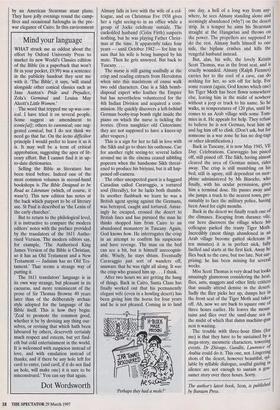Mind your language
WHAT struck me as oddest about the effort by Oxford University Press to market its new World's Classics edition of the Bible (in a paperback that won't fit in your pocket, £9.99) was a sentence in the publicity handout they sent me with it. 'The Bible', it says, 'will stand alongside other conical classics such as Jane Austen's Pride and Prejudice, Zola's Germinal and Louisa May Alcott's Little Women.'
The word that tripped me up was con- ical. I have tried it on several people. Some suggest an amendment to iconic fall; others to canonical; one sug- gested comical, but I do not think we need go that far. On the lectio dtfficilior principle I would prefer to leave it as it is. It may well be a term of critical approbation, suggesting the apex of lit- erary effort. But I cannot find it in up- to-date dictionaries.
Selling the Bible as literature has been tried before. Indeed one of the most common volumes in second-hand bookshops is The Bible Designed to be Read as Literature (which, of course, it wasn't). This new edition has notes at the back which purport to be of literary use. St Paul is described as 'the Lenin of the early churches'.
But to return to the philological level, it is instructive to compare the modern editors' notes with the preface provided by the translators of the 1611 Autho- rised Version. The modern editors say, for example, 'The Authorised King James Version of the Bible is Christian, so it has an Old Testament and a New Testament — Judaism has no Old Tes- tament.' That seems a strange way of putting it.
The 1611 translators' language is in its own way strange, but pleasant in its caesuras, and more reminiscent of the prose of Sir Thomas Browne 40 years later than of the deliberately archaic style adopted for the language of the Bible itself. This is how they begin: 'Zeal to promote the common good, whether it be by devising any thing our- selves, or revising that which hath been laboured by others, deserveth certainly much respect and esteem, but yet find- eth but cold entertainment in the world. It is welcomed with suspicion instead of love, and with emulation instead of thanks; and if there be any hole left for cavil to enter, (and cavil, if it do not find an hole, will make one) it is sure to be misconstrued.' You can say that again.
Dot Wordsworth


































































 Previous page
Previous page